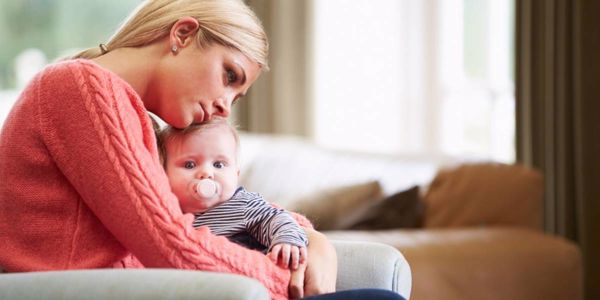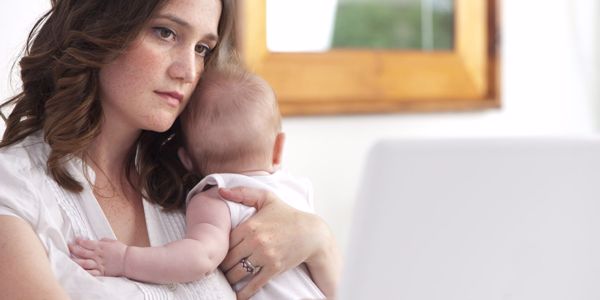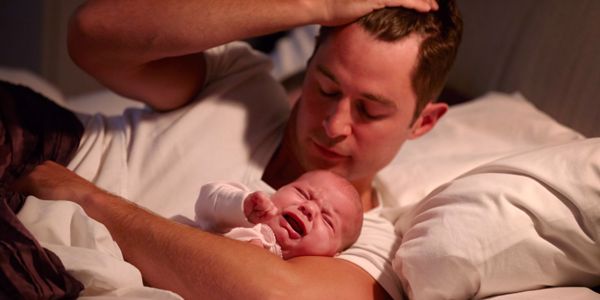Having been a blogger for several years, I’m used to sharing my life with the internet. It comes with the territory to open up and discuss all aspects of your life, to let those who follow you in. But there is one area, I haven’t opened up about as much as I would like, and that is my experiences of depression during, and shortly after, pregnancy.
I was first diagnosed with depression when I was twelve years old, following the death of my beloved granddad, which coincided with abuse from a family member. It was a tough time for me, and I coped by talking to a counsellor, specialising in children and teenagers with mental illnesses.
When I fell pregnant aged twenty, single and in my placement year of a four-year university degree course, I found myself back in that familiar abyss of depression. As sure I was that I was making the right decision by continuing with the pregnancy and keeping my baby, I felt hopeless and terrified, deep down, that life wouldn’t feel positive again.
That first pregnancy, when I was still a young girl myself, unsure of everything and not really prepared in any way for how my life was about to change, I don’t remember much of it, if I’m honest. I remember needing to go to a counsellor, because I was assessed as being high-risk for postnatal depression, with my history of mental illness, and the fact that I was alone and a young parent.
I remember not really being as open as I was meant to be during those sessions. There was, and to some extent still is, such a stigma around depression, especially in pregnancy, that I was worried if I let on just how upset I was feeling, they might decide to take my baby away from me when it was born.
Instead, I battled through these intense feelings of fear and worthlessness, worrying behind closed doors that I wouldn’t be a good mum, that I wasn’t ready. When I had my son, a few months after my twenty-first birthday, I did struggle with my mental health, as they had assumed I would.
I remember an incident when Cameron was just a few months old where I handed him to my mum, whilst I was around her house, and just walked out of the front door and down the road, not knowing where I was headed, and not caring, just wanting to not be his mum anymore as I felt I wasn’t doing a good enough job at it, that I wasn’t good enough for him.
My mum came out after me and brought me back inside, sat me down and held me and Cameron until the pain inside of me subsided a little. It was the turning point for me and when, the next day, I read an article in a magazine about a celebrity, I can’t remember which one now, being diagnosed with postnatal depression, I knew I had to talk to a doctor and get the help I needed to be there for my son.
Talking to the doctor about how I felt was hard, those fears of Cameron being taken away from me were still there, but I knew I had to put my trust into the doctor and work on getting better. I went back to counselling and, this time, it worked. I managed to lift the dark cloud long enough to see the sunlight hiding behind it, and I got myself better slowly but surely.
When Cameron was one, I met a man and, within a very short period of time, we decided to try for a baby. I was pregnant with my daughter, Carly very soon afterwards and this time I wasn’t monitored for antenatal depression, as I had been with Cameron. To the outside world, it probably looked like I was happy, in a stable relationship with everything going for me, a world away from the young, scared twenty-year-old I had been just a couple of years before.
However, inside my head, I was fighting an internal battle. I wasn’t happy with my partner, but I couldn’t imagine life as a single mum of two. Surely things would get better, I told myself.
We actually filmed the majority of my pregnancy with Carly for a show that was aired on Channel 4 the next year. It was all self-shot footage but, watching it back, seeing the edited version on TV, it was clear how low I had been during my second pregnancy.
When Carly was born, I managed better than I thought I would, especially under the circumstances, and it wasn’t until my marriage broke down and I lost my dream job as a wedding coordinator the following year that I ended up going onto medication for my depression.
There is definitely a stigma behind antidepressant medication, that I hope one day is lifted entirely. There is nothing to be ashamed of about taking tablets to help cope with a mental illness. It is an illness and you shouldn’t feel judged for taking medication to help, just as you wouldn’t be for taking antibiotics for a chest infection or having an inhaler for asthma.
Your Baby Club and Center Parcs are giving you a chance to win a family break in a Woodland Lodge at a UK Center Parcs village of your choice.
At this point, I was in a new relationship with my now-husband. After just over a year together, we discovered I was expecting my third baby, a little boy. I was still taking antidepressants.
Benjamin wasn’t planned, but we were both incredibly happy to find out about the pregnancy. I hate that one of the first thoughts I had was whether I would be judged for being on medication whilst pregnant.
Fortunately, I had a lovely midwife, from the homebirth team in Poole, where we were living at the time, and she reassured me that it was more common than I thought to be taking depression medication whilst pregnant.
I had to see a consultant at the maternity hospital throughout my pregnancy, and I did reduce my dosage over time. By six months, I felt strong enough to come off of my tablets completely.
I was not pressurised to do this, in fact, I was told it would be safer to stay on them than risk withdrawals if I couldn’t cope without them. I was happy with my decision and felt better than I had throughout my other two pregnancies in those last few months.
Unfortunately, Benjamin’s birth was not the relaxed and peaceful home birth I had planned but a whirlwind induction in hospital on his due date after a scan showed signs he had stopped growing. The birth was traumatic, and the way I was treated afterwards by the medical staff left me scarred not physically but mentally.
I ended up having to self-discharge myself as they were telling me I had to stay in for 48 hours for Benjamin to be monitored for signs of withdrawal from the medication. When I
said I would be leaving, they told me horror stories about what could happen and what symptoms to look out for, and made me feel awful for not staying.
When I spoke to my homebirth midwife afterwards, she said that I would not have had to go in and have Benjamin monitored had I stayed at home, as I had been signed off by the consultant as being ok for a home birth.
It upset me so much that their treatment of me, and lack of understanding and compassion for a new mother with a mental illness, tainted Benjamin’s birth. I suffered from severe anxiety following my pregnancy with Benjamin and have since gone through two rounds of Cognitive Behavioural Therapy and am back on medication currently.
This time I refuse to feel bad about resorting to medication. I know that I am doing what is best for the time being for myself and my family. Taking antidepressants for my depression and anxiety allows me to be the best mum I can be for my three children, and that is nothing to be ashamed of.
If you are suffering with your mental health, whether during pregnancy or after birth, please don’t feel ashamed to ask for help. It may be scary taking that first step, but believe me, you can get through this and it doesn’t make you any less of a mother for admitting you need support.






